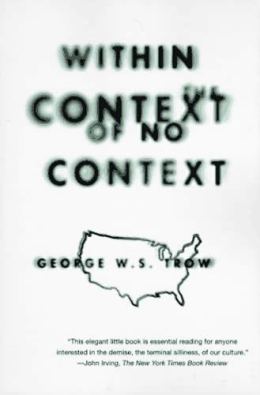
What made George W.S. Trow’s 1981 book a brilliant critique of television was that it was also a critique of the television audience and a world that was shaping itself in imitation of television. TV, the New Yorker essayist argued, had erased the traditional contexts and associations that had given life order and replaced them with a temporary, arbitrary, relativistic “no-context.” Where people once belonged to cultures, they were now audiences; where there was once history, there was now a random succession of events and images; where there were once tribes, there were now only the mass and the individual. Trow’s book — epigrammatic, more prose poem than editorial — is a kind of channel-surfing experience: you can almost hear the click of a remote control as it shifts from observation to observation. And though Trow wrote in a different media era of three big networks, Within the Context of No Context proves prescient about TV’s future: “The lie of television has been that there are contexts to which television will grant an access. Since lies last, usually, no more than one generation, television will re-form around the idea that television itself is a context to which television will grant an access.” Who wants to watch the Survivor reunion episode?
